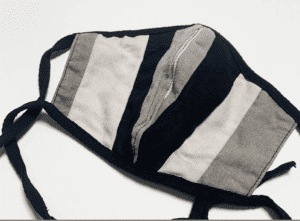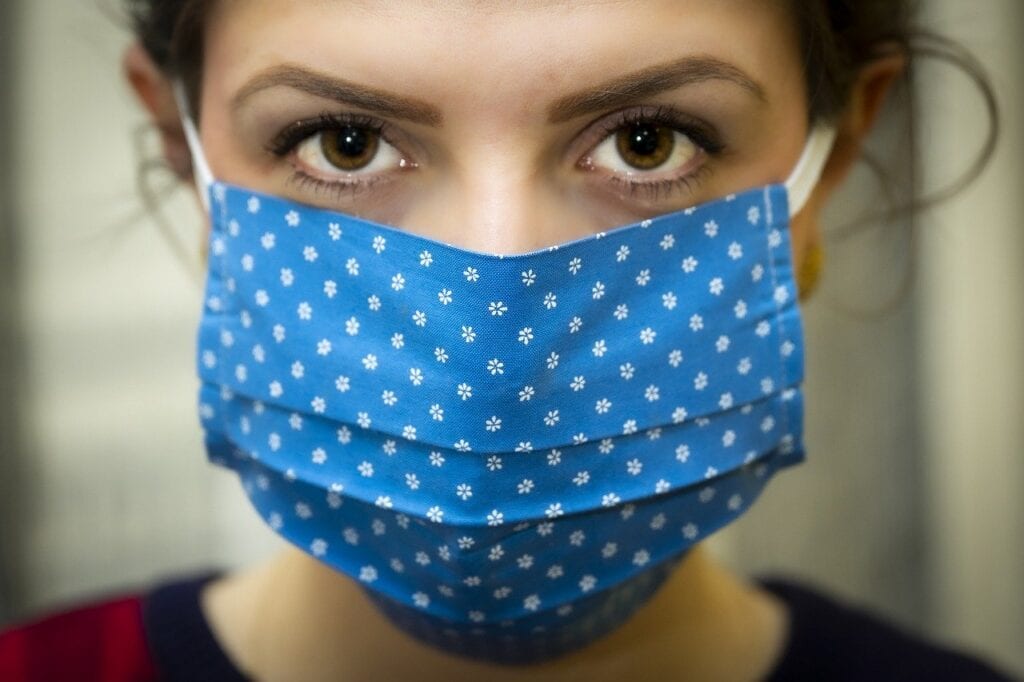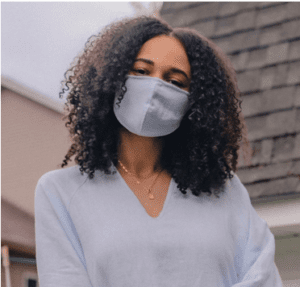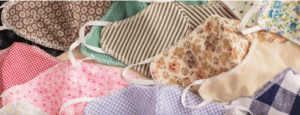
Masks have become a world-wide necessity since the start of Covid-19. The CDC recommends wearing masks to prevent the spread of Covid-19 and to protect yourself from contracting it. Sadly, disposable masks are already filling landfills and oceans causing pollution and harming marine life. Like many household goods, disposable masks eventually break down into micro-plastics and end up in the ocean, fish, soil and our food! It’s crazy to think that this object made to protect us from getting sick, can harm us in the long run. So, we must dispose of them properly and look for eco-friendly options!

What’s the Solution?
Surgical grade and N95 masks should be saved for medical professionals, as they face the most severe COVID-19 exposure. Consumers have more flexibility when choosing a mask, which means we have the opportunity to choose sustainable masks. The first step is to buy a reusable mask, but there are also certain types of reusable masks that are better for the environment, made to last longer, and more protective. Masks should be washed after every use, so it’s a good idea to keep several on hand. I typically hand wash my mask in my kitchen sink and hang it or lay it flat to dry. If you find yourself having to use a disposable mask, please CUT THE EAR LOOPS before disposing it to ensure it won’t become wrapped around a sea creature. We also need to keep in mind what the mask is made of and what impact the fabric can have on the environment. For more information about the impact of the fashion industry on our environment, please refer to my “Explore” page.
Remember, because of the efforts companies have to go through to be sustainable and because many aren’t mainstream companies, the cost can be slightly higher, but I encourage you to view this purchase as an investment in the environment and our future. Also, if more people support these efforts, the prices will eventually come down as these sustainable companies will become the norm!
So, without further ado, here are my sustainable mask recommendations:
 Sustainable Practices: I really like this company because they search for fabric remnants that larger companies dispose of, and they use this fabric to make clothing- and masks. Smaller pieces of fabrics can be woven into yarn. Rather than allowing this fabric to end up in a landfill, they repurpose it. The designs on their fabric are made from screen printing using non-toxic, water-based inks. Their products are hand-made to prevent waste. The ship sustainably in bags made from 100% recycled materials.
Sustainable Practices: I really like this company because they search for fabric remnants that larger companies dispose of, and they use this fabric to make clothing- and masks. Smaller pieces of fabrics can be woven into yarn. Rather than allowing this fabric to end up in a landfill, they repurpose it. The designs on their fabric are made from screen printing using non-toxic, water-based inks. Their products are hand-made to prevent waste. The ship sustainably in bags made from 100% recycled materials.
Masks: Their masks are made with 3 layers of quilted cotton or linen. They are made with ties rather than elastic around the ears, which is more comfortable and eliminates elastic, which contains plastic. You have the choice of mixed colors, Tonle prints, or quilted patterns.
Cost: 5 masks for $28, 10 masks for $50
Pros: They are comfortable and cute. Available in two sizes: Small or Medium
Cons: While they ship sustainably, the masks are sterilized and placed in poly bags for sanitary reasons. I’m not happy about shipping in plastic.
Other than the unfortunate use of plastic for shipping, I think this company is on the right track with regard to their zero-waste philosophy with fabrics and desire to eliminate waste from the fashion industry.
Sustainable Practices:
This company, located in Minnesota, USA has a sustainable
mindset. To reduce waste, many of their products are not made until ordered. “Many of the fabrics they use are sourced from a local, family-owned fabric store that specializes in run-off and second-hand fabrics. They also strive to only use fabrics that are natural fibers or biodegradable. Any fabric waste produced is dropped off at a local fabric recycling center.” (HDH) What’s super interesting is they will take back HDH clothing that you no longer want and will repair it or repurpose it while giving you $20 of HDH bucks towards a new purchase from their site.
Masks: They have several options. Molded masks with elastic with or without filter options, pleated masks, and masks that tie. They ship via USPS- free in the US and $20 internationally.
Cost: $13- $15 per mask
Pros: Comfortable and cute. Two sizes: Adult and Child.
Cons: Some of the fabric is imported. Lengthy shipping times due to Covid.
Sustainable Practices: These faces masksare all made from deadstock fabric. Deadstock fabric is leftover fabric from fashion brands that overestimated its need and has leftover, unused fabric that would go to a landfill if not “rescued” by a sustainable company. They have partnered with companies to help reduce their carbon emissions when shipping. They are focused on carbon offsets.
Masks: They’re made with deadstock fabric and/or organic cotton. They are form fitting and use elastic around the ears
Cost: 3 packs from $30-$38 depending on the fabric + shipping.
Pros: They fit nicely and have really cute patterns. They come in adult and children’s sizes.
Cons: Elastic is not usually environmentally friendly and the fabric on these masks is a bit thin.



Thanks for sharing this, Kristen. I hope more people think about the impact they’re making by the small choices that they make. I hope you are staying safe at the hospital.
This is a great reminder also for us medical professionals-the facilities director at our hospital is constantly reminding people to dispose of their masks appropriately. They find discarded masks in the parking lots.